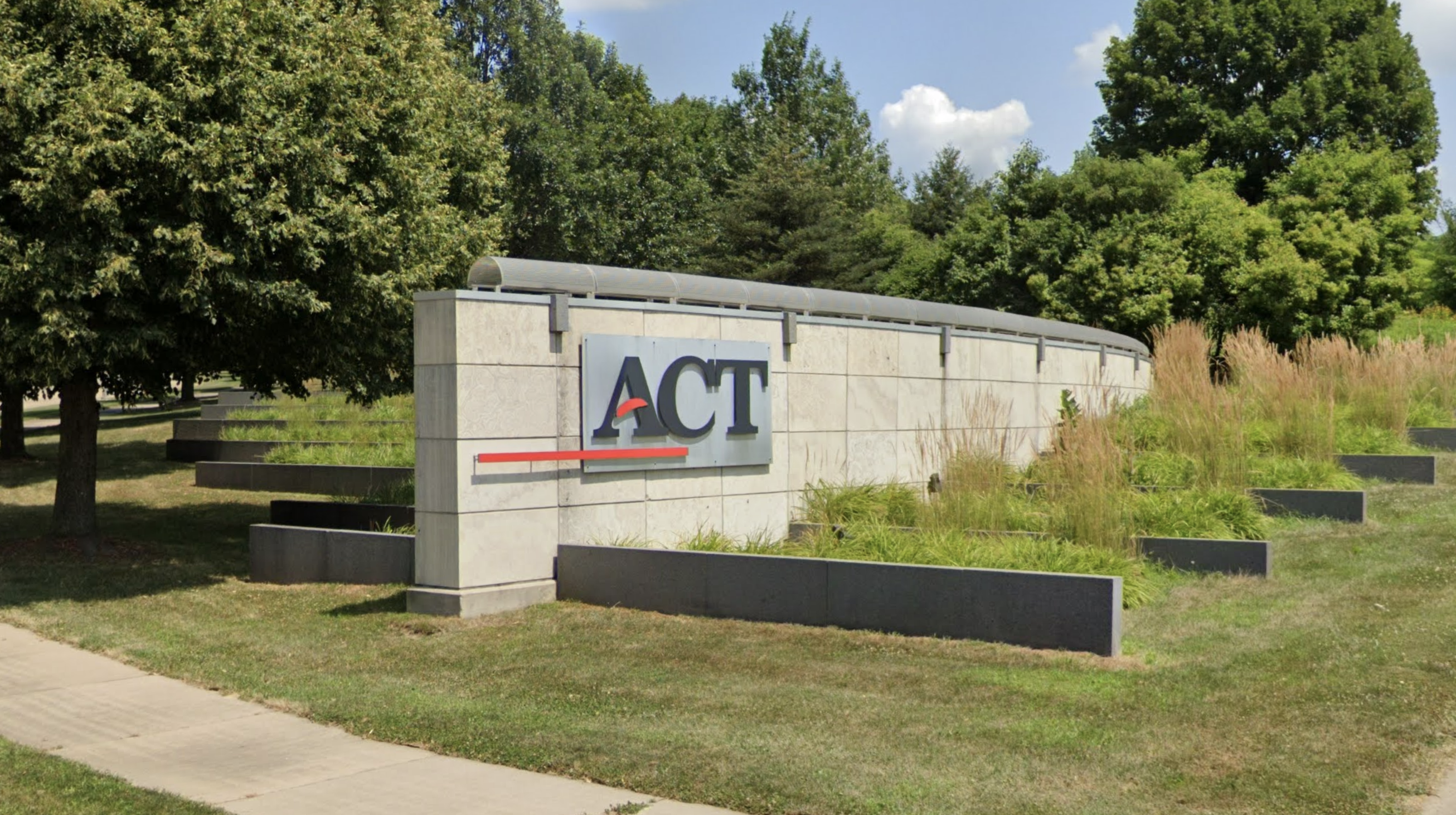This story is a part of the CBJ’s Newsmakers edition. This year-end wrap-up from the staff of the Corridor Business Journal is a compilation of the year’s most noteworthy articles and projects, as told through stories that appeared in the bi-weekly issues of the CBJ.
This story was originally published in May 2024.
Educational organization and former nonprofit ACT made headlines last month when it announced a partnership with Nexus Capital Management LP, a Los Angeles-based private equity firm that exercises majority ownership over the institution.
The restructuring merged ACT with its subsidiary Encoura, an education data science and research organization, and produced a new nonprofit, IntermediaryEd, which exerts minority ownership and will continue ACT’s work of college and career readiness, said ACT CEO Janet Godwin.
“They’ll be thinking through how they can have the biggest impact in that very large domain of college and career readiness, so they have some strategic planning work to do to really focus on what their work will be,” she said, estimating the process to take nine to 12 months.
There are several reasons a nonprofit organization may switch to a for-profit model, said Paul Thelen, director of the Larned A. Waterman Iowa Nonprofit Resource Center (LAWINRC) at the University of Iowa, in an email to the CBJ.
In some situations, an organization might expand its operations by attracting investors who are looking for a financial return instead of depending on donations from donors.
“In other instances, it may be that the for-profit structure provides greater flexibility and autonomy in decision making with fewer restrictions than tax-exempt entities,” he added.
Turbulent times precipitated restructuring
Prior to its buyout from Nexus Capital Management, ACT faced a series of setbacks. In June 2022, it sold the Tyler Building on its main campus to the Iowa City Community School District for $8.7 million, citing the need to consolidate and downsize its footprint since many of its employees opted to work remotely or on a hybrid basis following the pandemic.
A year later, it laid off 106 employees, 40 located in Iowa City. The layoffs were blamed on dramatic shifts in education and workforce environments.
“Our industry is undergoing large-scale, rapid changes such as increased demand for online offerings and disruptions in supply chains, requiring organizations like ACT to adapt rapidly if they are to grow and continue to fulfill their mission,” Ms. Godwin told the CBJ in a May 2023 article, noting that the organization was seeking to transition to a “technology model” to better meet the needs of students and educators.
The national decline of college admission test requirements in the past few years has been another contributing factor to ACT’s financial struggles.
According to data from the National Center for Fair and Open Testing, known as FairTest, more than 80% of U.S. four-year institutions will either not require SAT and ACT scores or will not consider them if submitted for the fall 2025 admissions cycle.
“Despite a media frenzy around a single Ivy League school reinstating testing requirements, ACT/SAT-optional and test-blind/score-free policies remain the ‘new normal’ in undergraduate admissions,” FairTest executive director Harry Feder said, in a February news release. “Test-optional policies continue to dominate at national universities, state flagships, and selective liberal arts colleges because they typically result in more applicants, academically stronger applicants and more diversity.”
According to Inside Higher Ed, ACT recorded net losses for three years in a row – $60.5 million in 2020, $6 million in 2021 and $12 million in 2022.
The organization faced a critical self-assessment, acknowledging that shifts in the workforce and educational landscape made it infeasible to continue to achieve its goals, meaning it needed to adapt and consider restructuring.
Nexus meets need
ACT’s board of directors sought a private equity firm with experience in the education workforce, social impact organizations, and a focus on sustainable profitability and a history of long-term investments, Ms. Godwin said.
“They’ll be able to help us with resources that we may need to be able to accelerate in a really dynamic environment,” she said.
“We need to be able to invest in new product development, that we would do it organically, or be able to invest capital in inorganic growth opportunities, whether it’s through mergers, acquisitions, investments in third parties. And so we needed that sort of capital to continue to build on our capabilities and solutions that didn’t move at the pace that we needed to move,” she continued.
Nonprofit assets non-transferable, but can be worked around
When nonprofits restructure, their articles of incorporation and bylaws must comply with Iowa Code 504’s dissolution and merger requirements. The articles of dissolution confirm that the board of directors and/or members followed proper procedures and include a plan for paying liabilities and distributing assets.
Under Iowa law, a nonprofit’s assets have to be used for charitable purposes and cannot be converted to a for-profit entity. Either the asset or its value are transferred to an organization with a similar purpose, or in some cases, revert back to the beneficiary.
In ACT’s case, it was able to retain its assets with the creation of a new nonprofit. The 64-year-old institution registered its new name – IntermediaryEd – with the Iowa Secretary of State’s office on May 2.
Ms. Godwin said the board of directors that previously governed ACT will also direct IntermediaryEd, with the caveat that one individual will also sit on the board of the “new ACT” as part of its minority share.
There will also be a new board that leads the “new ACT” with representation from Nexus and industry leaders, said Ms. Godwin.
“I think that is important to ensure alignment with ACT’s strategy or good core strategy, you know, making sure that we’re continuing to serve that effectively.
“Good board members, they’ll obviously contribute to fiduciary oversight and governance – making sure we’re attending (to) mostly fiduciary responsibilities that board members go through but again, I think it’s an alignment and certainty that the new ACT will stay aligned to our mission and strategy. I think that’s going to be a big part of the IntermediaryEd board members’ role on our new ACT board,” she said.
Applying for a new tax ID was just one facet of making the switch from a nonprofit to a for-profit model, said Ms. Godwin.
“We’re operating as a public benefit corporation, which requires there to be a mission of public good, that the company’s programs and services has to contribute to public good. And the PBC also has to operate with sustainable financial practices,” she said. “That was important for us as a for-profit to be a public benefit corporation because of those sorts of controls in our charter, for how we’re going to operate and so again, that felt very true to the ACT mission.”
The company’s offerings will remain the same, with the exception of “moving more quickly in a very demanding and dynamic market.”
“Our goal is to be able to meet the needs of our customers and stakeholders more effectively and more quickly, than we were able to do before this partnership with Nexus,” said Ms. Godwin.
Private equity investments vs. nonprofits
Private equity investments in nonprofits aren’t a regular occurrence, but they do happen.
“Where in the past founders may have selected a nonprofit corporation with tax-exempt recognition as a structure for its work, we are seeing some choose alternative structures. Sometimes, this is based on what is provided in state law,” said Mr. Thelen, citing the Chan Zuckerberg Initiative, an LLC founded and funded by Facebook’s Mark Zuckerberg and his spouse, Priscilla Chan.
“If you were to read CZI’s mission, it would echo many of the missions of similar nonprofit entities. But, the LLC form was purportedly selected for several reasons, including the control of decision- making by its founders,” he added.
ACT’s mission unchanged, plans to maintain Iowa City presence
ACT’s mission will not change, but it will “energetically” pursue meeting and anticipating customers’ needs.
“I think our customers will continue to see the level of quality of the service they’ve come to know and expect from ACT. That will not change. What I think people will notice with ACT is that we will be bringing more features, services, programs to the table in a way that can be easily adopted and used to help inform this planning, getting ready for life after high school. So I think that’s what people will see us doing differently, is bringing more tools and services more quickly, that are really honed into what the customer’s needs are,” said Ms. Godwin.
The company plans to stay in Iowa City and operate as a “committed member of the community,” building on its history and legacy within the region.
“One other message for the community is, we’re growing and we want to continue to bring our growth here and have it manifest in our local community and region,” said Ms. Godwin, but points out that while ACT remains headquartered in Iowa City, it’s a global company that serves a much larger community of stakeholders.
“There’s so many different macro factors nationally, internationally, that guide us in our decision making strategies,” said Ms. Godwin, which makes it operate differently than most community businesses.
“But, we love our city. We’re committed to Iowa City and the region,” she added.
While ACT still considers Iowa City home base, it announced May 9 that it “entered into an agreement” to sell its campus to Iceberg Development Group for an undisclosed amount of money, remaining on campus as a tenant.
A news release said a “community and mission figure (is) prominently in plans for (the) campus development” and ACT will plan the campus’s development with an unnamed nonprofit. The nonprofit’s broker, Cushman & Wakefield, could not be reached for comment at the time of publication.
Newsmakers update: Ownership of ACT site remains the same
Three months after announcing a strategic partnership with Nexus Capital Management LP that pivoted the company to for-profit status, ACT announced two fundamental changes to its standardized test used for college admissions.
The science portion of the exam is now optional, with English, reading, and math remaining the core sections of the ACT test.
“Like the writing section, science will be offered as an additional section. This means students can choose to take the ACT, the ACT plus science, the ACT plus writing, or the ACT plus science and writing,” said ACT CEO Janet Godwin, in a July blog post. “With this flexibility, students can focus on their strengths and showcase their abilities in the best possible way.”
Testing times for the core exam have also been reduced by one-third, lasting two hours instead of three due to shorter reading passages and fewer questions in each section.
“This change is designed to make the testing experience more manageable for students, enabling them to perform at their best without the fatigue that often accompanies longer exams,” Ms. Godwin said.
Coinciding with its partnership announcement, ACT also announced its intention to sell its property to Des Moines-based Iceberg Development Group.
As of this update, the property surrounding ACT’s headquarters at 500 ACT Dr. — a tract of land north of Scott Boulevard and south of Dodge Street — is still listed under ACT, Inc., according to the Iowa City Assessor.
IntermediaryEd, the legal name for ACT, Inc., is a nonprofit formed following ACT’s restructuring and merger with its subsidiary Encoura, an organization focused on education data science and research.
ACT declined to comment for this update and representatives of the real estate transaction with Iceberg Development Group could not be reached.





